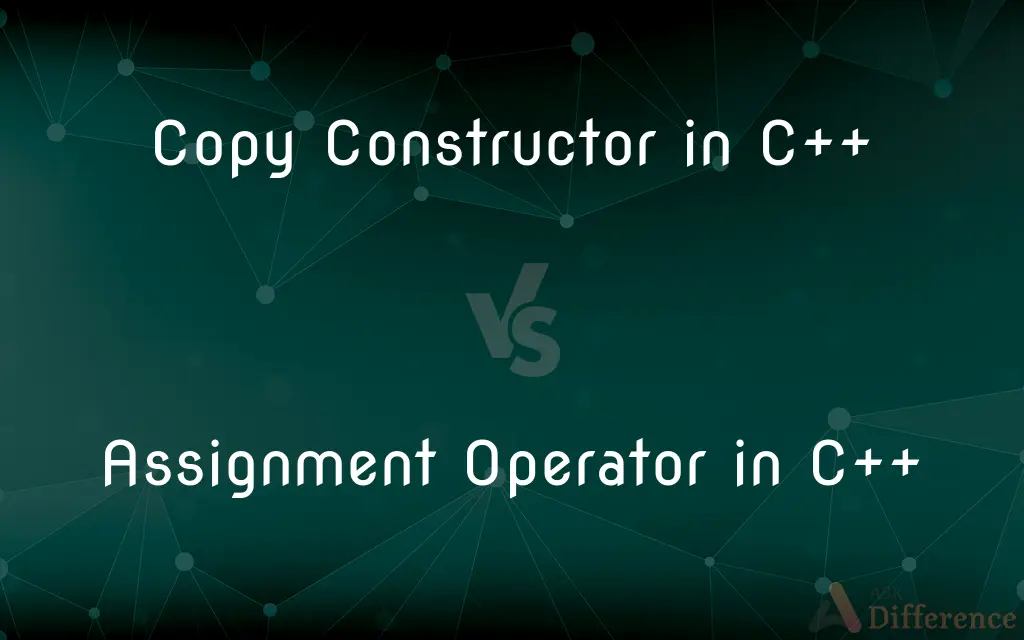Copy Constructor in C++ vs. Assignment Operator in C++ — What's the Difference?
By Tayyaba Rehman & Urooj Arif — Published on February 6, 2024
Copy Constructor in C++ creates a new object as a copy of an existing object. Assignment Operator in C++ assigns the values from one existing object to another already existing object.

Difference Between Copy Constructor in C++ and Assignment Operator in C++
Table of Contents
ADVERTISEMENT
Key Differences
The Copy Constructor in C++ is used during the creation of an object to initialize it with values from another object of the same class. The Assignment Operator in C++, on the other hand, is used to copy values to an already existing object from another object of the same class.
Copy Constructor in C++ is called when a new object is created from an existing object, as a copy of the existing object. In contrast, the Assignment Operator in C++ is used when an already initialized object is assigned a new value from another existing object.
A Copy Constructor in C++ may be called implicitly in several scenarios, such as passing objects by value. The Assignment Operator in C++ is explicitly called when an assignment operation occurs between two existing objects.
The Copy Constructor in C++ is crucial for classes that have pointers or dynamic resources, to ensure a deep copy. For the Assignment Operator in C++, it's essential to handle self-assignment and ensure proper resource management, often using the copy-and-swap idiom.
Copy Constructor in C++ can be used to create a new object based on the state of an existing object, thereby not altering the existing object. The Assignment Operator in C++, however, typically alters the state of the object it is assigned to, replacing its current state with that of another object.
ADVERTISEMENT
Comparison Chart
Purpose
Initializes new object with another object's values
Assigns values from one object to another existing object
Usage Scenario
Called when creating a new object
Used on already initialized objects
Functionality
Creates a copy of an object upon creation
Overwrites an object's existing values
Handling Resources
Ensures proper initialization of resources
Manages resource allocation and avoids self-assignment
Implicit/Explicit Call
Often called implicitly
Called explicitly during assignment
Compare with Definitions
Copy Constructor in C++
Used for initializing one object from another during object creation.
MyClass newObj(existingObj); uses the copy constructor for initialization.
Assignment Operator in C++
Used for copying data to an already initialized object.
MyClass obj1; obj1 = obj2; copies obj2 to obj1.
Copy Constructor in C++
Initializes an object by copying data from another object of the same class.
MyClass obj1(obj2); creates obj1 as a copy of obj2.
Assignment Operator in C++
Often implemented using the copy-and-swap idiom for exception safety.
Obj1 = std::move(obj2); uses assignment operator with copy-and-swap.
Copy Constructor in C++
Invoked when returning an object from a function by value.
Return myObject; in a function invokes the copy constructor for myObject.
Assignment Operator in C++
Overwrites an object's existing data with another object's data.
ExistingObj = newObj; replaces existingObj's data with newObj's.
Copy Constructor in C++
Copy Constructor is called when passing an object by value.
Void function(MyClass obj) calls the copy constructor for obj.
Assignment Operator in C++
Assigns values from one object to another of the same class.
Obj1 = obj2; assigns values of obj2 to obj1.
Copy Constructor in C++
It's essential for deep copying in classes with dynamic memory allocation.
MyClass obj1 = obj2; allocates separate memory for obj1's resources.
Assignment Operator in C++
Typically includes handling of self-assignment and resource management.
Obj = obj; safely handles self-assignment.
Common Curiosities
What is the role of the Assignment Operator in C++?
It assigns values from one existing object to another.
Is the Copy Constructor in C++ implicitly called?
Yes, it's often called implicitly in various scenarios.
What does a Copy Constructor in C++ do?
It initializes a new object as a copy of an existing object.
Can the Copy Constructor in C++ handle dynamic resources?
Yes, it's essential for handling dynamic resources and ensuring deep copies.
Can the Assignment Operator in C++ be called implicitly?
No, it's explicitly called during an assignment operation.
When is the Copy Constructor in C++ called?
During the creation of an object, passing objects by value, or returning objects from functions.
How does the Copy Constructor in C++ affect the existing object?
It doesn't alter the existing object, just creates a new copy.
Can Copy Constructor in C++ be overridden?
Yes, a custom copy constructor can be defined.
What happens if no Copy Constructor is defined in C++?
The compiler provides a default shallow copy constructor.
How does the Assignment Operator in C++ differ in usage?
It's used for assigning values between two already existing objects.
What's the default behavior of the Assignment Operator in C++?
By default, it performs a shallow copy of non-static members.
How do Copy Constructor and Assignment Operator in C++ manage memory?
Both must handle memory management carefully, especially for deep copying in classes with dynamic memory.
Does the Assignment Operator in C++ alter the object it's assigned to?
Yes, it replaces the current state of the object with that of another object.
What special considerations are there for the Assignment Operator in C++?
It should handle self-assignment and manage resources, often using the copy-and-swap idiom.
Is overriding the Assignment Operator in C++ common?
Yes, especially in classes with dynamic resources or complex copying logic.
Share Your Discovery

Previous Comparison
Independence Day vs. Republic Day
Next Comparison
Live vs. LivesAuthor Spotlight
Written by
Tayyaba RehmanTayyaba Rehman is a distinguished writer, currently serving as a primary contributor to askdifference.com. As a researcher in semantics and etymology, Tayyaba's passion for the complexity of languages and their distinctions has found a perfect home on the platform. Tayyaba delves into the intricacies of language, distinguishing between commonly confused words and phrases, thereby providing clarity for readers worldwide.
Co-written by
Urooj ArifUrooj is a skilled content writer at Ask Difference, known for her exceptional ability to simplify complex topics into engaging and informative content. With a passion for research and a flair for clear, concise writing, she consistently delivers articles that resonate with our diverse audience.
















































